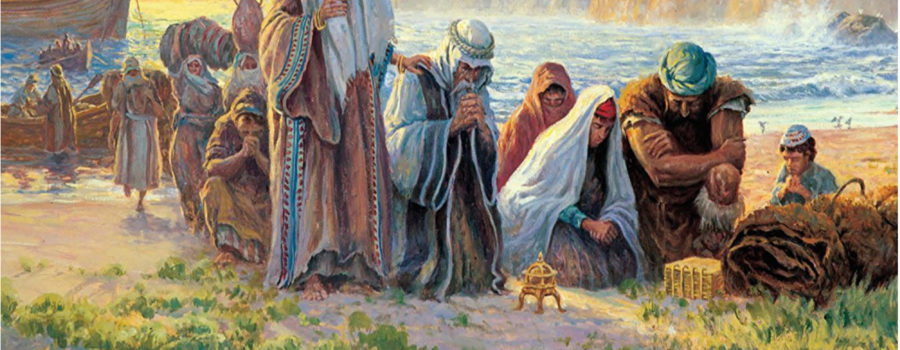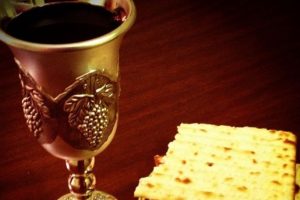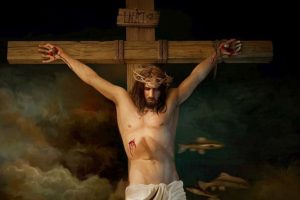The Stick of Joseph opens with an account of Lechi’s family fleeing Jerusalem, returning to the city to obtain the “record of the Y’hudim [Jews]” then traveling to the Red Sea, across the desert to the ocean, and ultimately across the ocean to a new land of promise on the American continent (see 1 Nefi, chapters 1-5). This journey demonstrates many parallels to the Exodus of Israel from Egypt. In this post, we’ll examine some of those parallels and consider the Passover setting for Lehi’s flight into the wilderness. We’ll start with this bullet-point summary of the major events of this trip:
- Lechi sees a vision in which he learns of the coming destruction of Jerusalem.
- He is warned by God to take his family and flee.
- They travel three days’ journey into the wilderness where the Lord commands them to return to Jerusalem and retrieve the “record of the Y’hudim” that is “engraved upon plates of brass.”
- Lechi’s sons attempt to negotiate with Lavan to take the brass plates record with the into the wilderness, but Lavan refuses.
- Lechi’s son Nefi sneaks into the city at night, finds Lavan drunk, decapitates him and then impersonates him to retrieve the brass plates.
- Lechi’s sons return to the family’s camp in the wilderness with the brass plates, and the journey continues shortly thereafter.
- Lechi receives a director called the “Liahona” that provides guidance in their journey.
- They travel along the contours of the Red Sea, eventually crossing the wilderness to reach the ocean, and crossing the ocean to reach the Land of Promise.
With these points in mind, let’s look at some particulars from the account.
Lechi’s Visions and the Exodus
In Lechi’s first vision (1 Nefi 1:3), he saw a “pillar of fire,” which certainly recalls the pillar of fire that led the Children of Israel in the wilderness. In Lechi’s second vision (also 1 Nefi 1:3) he saw twelve stars following one that descended “out of the midst of Heaven” whose “luster was above that of the sun at noonday,” all of which brings to mind the twelve tribes, following the pillar of fire in the wilderness (Ex. 13:21).
Shortly thereafter in the narrative, Lechi is warned by the Lord to take his family and flee into the wilderness. The family departs quickly, reminding us of Israel’s flight into the wilderness out of Egypt after eating the passover meal “in haste” with “your loins girded, your shoes on your feet, and your staff in your hand” to be ready to depart immediately on their journey (Ex. 12:11).
The Brass Plates
Just as it was important for the Children of Israel to receive the two tablets of the Ten Commandments and the Torah at Mount Sinai before continuing their journey in the wilderness, it was important for the people of Lechi to obtain the Brass Plates because…
…they were desirable, yes, even of great worth onto us, insomuch that we could preserve the mitzvot of YHWH unto our children. Wherefore, it was wisdom in YHWH that we should carry them with us as we journeyed in the wilderness toward the land of promise.
1 Nefi 1:23
It bears mentioning that in Hebrew, the word for “plates” is לוחות (luchot)—the same word as the word for “tablets.”
Negotiations
In the Exodus narrative, Moses and his brother negotiated with Pharaoh for the freedom of his people, initially to travel “three days’” journey into the wilderness, just as Lechi’s group did initially. This negotiation process that required them to return several times, only to be denied their request. Likewise the process of obtaining the Brass Plates required Nefi and his brothers to come before Laban repeatedly only to be denied their request. In both cases, only death proved effective as the tool that overcame resistance to God’s will.
In the Egyptian case, it was the deaths of all the Egyptian firstborn that ultimately secured the release of Israel. In the present case, it was the death of Lavan that secured the release of the brass plates. There are two points to note in this parallel:
First, the plates were handed down among the descendants of Joseph of Egypt, and were written in Egyptian. This points to their Egyptian origin with Joseph and the likelihood that the brass plates were brought out of Egypt by the fleeing children of Israel, along with Joseph’s remains.
Second, Lavan, as Joseph’s descendent, was likely the firstborn in his family because he inherited the plates. He played the part of the Egyptian firstborn when his death secured the plates’ release.
Departure at Passover
Lechi’s actual departure from Jerusalem, as well as the retrieval of the brass plates likely took place during Passover. The text places the beginning of these events “in the commencement of the first year of the reign of Tzidkiyahu” (1Nefi 1:2) The “commencement of the first year” very likely refers to the month of Nisan, which is the first month of the year and the month in which Passover occurs. As we read in Exodus:
And the LORD spake unto Moses and Aaron in the land of Egypt, saying, This month shall be unto you the beginning of months: it shall be the first month of the year to you.
Ex. 12:1-2 KJV
The Passover celebration traditionally lasts 7 days, with the first day feast commemorating the deliverance of Israel from Egypt, and the last day feast commemorating the death of the Egyptians in the Red Sea. Lechi’s deliverance, which in a very real sense represents the deliverance of Israel, likely took place near the beginning of passover, and the death of Lavan (who represents the Egyptians) likely took place at the final feast. Indeed, prior to venturing into the city by night, Nefi uses the story of the Egyptians destruction in the Red Sea to rally his brothers’ support. (1 Nefi 1:15)
Such also explains Lavan’s drunkenness, full military regalia, and sojourn outside his house by night. Because Josiah’s reforms converted the Passover from a private, family-based observance in the home to a grand public celebration, it is likely Lavan was not the only one drunk that night. Nefi’s ability to avoid detection within the city, and Tzuram’s mistaking Nefi for Lavan, as well as Tzuram’s compliance with Nefi’s command to carry the plates out to what he thought would be “the brothers of the assembly”—all point to widespread inebriation among the revelers in Jerusalem that night.
Moreover, in his book The Lost 116 Pages; Reconstructing the Book of Mormon’s Missing Stories, Don Bradley presents evidence that the lost account of the Large Plates of Nefi contained the additional information that when Lavan was killed the people “had been having a great feast, and were all drunk.” (p. 123) pointing to a Passover setting for this event (pp. 121-144).
Lavan’s death (representing Egyptians) and the final deliverance of “the record of the Y’hudim” on this night is therefore entirely appropriate and highly symbolic.
Murmurings in the Wilderness
In the account of Lechi’s Exodus we are told that the people “…did suffer much for want of food.” Such that “Laman and L’mu’el and the sons of Yishma’el did begin to murmur exceedingly” and “that they did murmur against YHWH” (1 Nefi 5:7).
This recalls the events of the Exodus:
[3] And the children of Israel said unto them, Would to God we had died by the hand of the LORD in the land of Egypt, when we sat by the flesh pots, and when we did eat bread to the full; for ye have brought us forth into this wilderness, to kill this whole assembly with hunger.[8] And Moses said, This shall be, when the LORD shall give you in the evening flesh to eat, and in the morning bread to the full; for that the LORD heareth your murmurings which ye murmur against him: and what are we? your murmurings are not against us, but against the LORD.Ex. 16:2-3, 8 KJV
[2] And the whole congregation of the children of Israel murmured against Moses and Aaron in the wilderness:
Laman and L’mu’el murmured that Lechi had “led them out of the land of Yerushalayim… to perish in the wilderness” (1 Nefi 1:8). This recalls the murmuring of the Children of Israel “have you taken us away to die in the wilderness? Wherefore have you dealt thus with us, to carry us forth out of Egypt?” (Ex. 14:11 see also Num. 21:5)
And when Laman and L’mu’el said “it would have been better that they had died before they came out of Yerushalayim than to have suffered these afflictions” (1 Nefi 5:17) it recalls the murmuring of the Children of Israel in the wilderness: “Would God that we had died in the land of Egypt!” (Num. 14:2)
And when the daughters of Ishmael “did mourn exceedingly” and “did murmur against my father [Lechi]” and “they were desirous to return again to Yerushalayim” (1 Nefi 5:10) it recalls the murmuring of the Children of Israel in the wilderness:
[1] And all the congregation lifted up their voice, and cried; and the people wept that night.[2] And all the children of Israel murmured against Moses and against Aaron: and the whole congregation said unto them, Would God that we had died in the land of Egypt! or would God we had died in this wilderness![3] And wherefore hath the LORD brought us unto this land, to fall by the sword, that our wives and our children should be a prey? were it not better for us to return into Egypt?[4] And they said one to another, Let us make a captain, and let us return into Egypt.Numbers 14:1-4 KJV
The Liahona and the Brazen Serpent
When Alma turned the Liahona over to his son Chelaman, he referred to Lechi’s people in the wilderness saying “if they would look [at it] they might live” (Alma 17:7) whereas when the Children of Israel were in the wilderness and threatened by poisonous serpents, we are told that a brass serpent was set up such that “when he looks upon it, [he] shall live.” (Num. 21:8-9)
Being Led in the Wilderness
The description of Lechi and his people being led through the wilderness states:
And I will also be your light in the wilderness; and I will prepare the way before you, if it so be that ye shall keep my commandments. Wherefore, inasmuch as ye shall keep my commandments, ye shall be led towards the promised land; and ye shall know that it is by me that ye are led. Yea, and the Lord said also that after ye have arrived to the promised land, ye shall know that I, the Lord, am God, and that I, the Lord, did deliver you from destruction, yea, that I did bring you out of the land of Jerusalem. (1 Nefi 5:16)
This echoes the Torah descriptions of Israel being led through the wilderness:
[21] And the LORD went before them by day in a pillar of a cloud, to lead them the way; and by night in a pillar of fire, to give them light; to go by day and night:Ex. 13:21
[7] And I will take you to me for a people, and I will be to you a God: and ye shall know that I am the LORD your God, which bringeth you out from under the burdens of the Egyptians.[8] And I will bring you in unto the land, concerning the which I did swear to give it to Abraham, to Isaac, and to Jacob; and I will give it you for an heritage: I am the LORD.Ex. 6:7-8
The Top of a Mountain
Nephi’s call to a mountain top (1 Nefi 5:15) during the Exodus of the people of Lechi, recalls Moshe’s visit to Mount Sinai (Ex. 19:20; 24:12-13). On the mountain Nefi received instructions for the construction of a ship (1 Nefi 5:15, 25) which echoes the language of the instructions Moshe received on Mount Sinai for the construction of the Tabernacle (Ex. 25:1, 8-9; 35:30-33).
A Tabernacle in the Wilderness
Just as the people of Israel in the wilderness had a Tabernacle, there is evidence that the lost account of the Large Plates of Nefi included the additional information that the people of Lechi also traveled in the wilderness with a Tabernacle (see The Lost 116 Pages; Reconstructing the Book of Mormon’s Missing Stories by Don Bradley pp. 145-156).
Crossing the Sea
The Exodus of the Israelites involved crossing the Red Sea and a long sojourn in the wilderness before they reached the Promised Land, while the Exodus of Lechi’s people involved following the contours of the Red Sea, a long sojourn in the wilderness, then crossing an ocean in order to reach a Promised Land.
Summary
The above parallels are only a small sample of the parallels between Lechi’s exodus from Jerusalem to the Promised Land and Israel’s exodus from Israel to the Promised Land. A more complete treatment could fill a book. But even this limited summary demonstrates clearly that Lechi’s journey represents a second deliverance of Israel, filled with symbolism and meaning designed to highlight the importance the Lord ascribes to these events. The Stick of Joseph in the Hand of Ephraim is not only a clearly Jewish book, but it is also a book of destiny, pivotal to the ultimate deliverance and gathering of Israel in the last days.






Leave a Reply